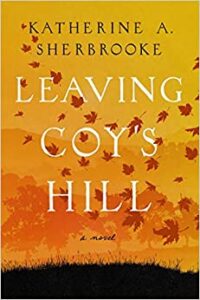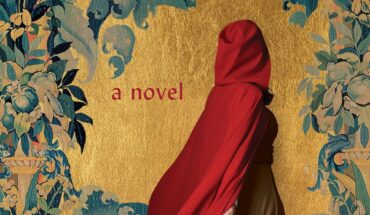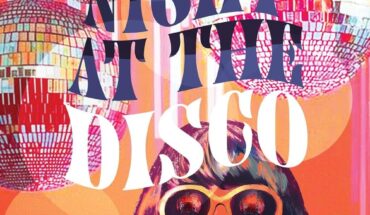 Leaving Coy’s Hill by Katherine Sherbrooke is based on the remarkable life of a little-known pioneering feminist and abolitionist Lucy Stone—the first woman in Massachusetts to earn a college degree, to keep her maiden name, and to fight for women’s rights. Sherbrooke’s beautifully written novel is a fascinating look at timeless issues—how we navigate motherhood and career, to marry or not, and how one fearless woman can spark change in the world.
Leaving Coy’s Hill by Katherine Sherbrooke is based on the remarkable life of a little-known pioneering feminist and abolitionist Lucy Stone—the first woman in Massachusetts to earn a college degree, to keep her maiden name, and to fight for women’s rights. Sherbrooke’s beautifully written novel is a fascinating look at timeless issues—how we navigate motherhood and career, to marry or not, and how one fearless woman can spark change in the world.
The story is both heart-wrenching and inspiring. A great book club read! Dead Darlings is thrilled to share this interview with GrubStreet’s own Katherine Sherbrooke.
Before I even started reading your book, the epigraph, a quote by Lucy Stone in 1893, grabbed me. But it really hit home after I finished the last chapter. “I think, with never-ending gratitude, that the young women of today do not and can never know at what price their right to free speech and to speak at all in public has been earned.” To what extent were you trying to communicate this point to today’s women?
It’s where the project started for me, in so many ways. In my childhood, I vividly remember the controversy over whether or not it was effective for women to burn their bras as a form of protest. I took the protest part of that for granted, having no idea it was once considered scandalous for women to even speak in public. Scandalous. This was the origin of the pervasive idea that those who dared speak out were considered “pushy” (and worse), proof that expanded rights for women would lead to “unwomanly” behavior, an idea that absurdly persists. I wanted to explore what it might have felt like to be one of those women determined to create substantial change at a time when they were expected to be wives and mothers and nothing else. The fact that Lucy herself was demure and known to have a voice as sweet as a babbling brook made the contrast between the idea of the frightening independent woman and the person Lucy was that much more interesting.
I’m a little embarrassed to admit I dressed up as Susan B. Anthony one Halloween, when I was like 12, and sadly, everyone said, “Oh look, it’s Mary Poppins.” I thought I knew a fair amount about the suffragettes, but I learned so much reading Lucy’s story. So why weren’t we taught more about her in history class, and why isn’t she a household name like Susan Anthony?
In my experience, we tend to oversimplify history. Women’s rights are often boiled down to suffrage, and suffrage is often boiled down to Susan B. Anthony. Winning the vote was one issue, but Lucy Stone’s life and career was about much more than that—marriage rights, property rights, the rights of women to their children, the right not to be beaten or raped in her own home. The history books like to gloss over those more uncomfortable topics in an attempt, in my view, to continually paint the birth of America as the origin of some perfect society. Just like we whitewash our racial failings, we do the same with our failings involving gender. As far as suffrage is concerned, Stone is left out of that discussion in great part because Susan B. Anthony and Elizabeth Cady Stanton actively wrote her out of the story. The reason for that is an important part of my book.
This book isn’t just about women’s rights, but also the abolitionist’s movement, and so much more that happened during the mid-to-late 1800s, which was quite a fraught time in history. So, let’s talk about your research process. I mean, you must have done so much, and yet the book doesn’t feel heavy with it. How did you do that?
Thank you for saying that. I do think it’s the job of a historical novelist to uncover the historical details that can be used to enliven the story rather than use the story as a way to cram in as many details as possible. That does take discipline, sometimes! I break down my research into two broad categories. The first is understanding the basic facts of the era—timelines, major events, the cast of characters involved. For me this meant reading a ton of non-fiction, often academic accounts, about not just Lucy, but all the important people in her life and the era itself. The second, and far more interesting research for me, is reading primary sources—newspapers of the day, memoirs, diary entries and letters. These tell you what kinds of things were considered commonplace and what sorts of things were shocking, how people thought and the words they used to describe the world around them. For me, it’s the details that are too “small” for the history books that allow the story to take shape in my mind. Like the fact that Lucy had a hose turned on her in the middle of a speech and kept talking. Or that Lucy’s mother sometimes made and sold extra cheese without telling her husband so she would have enough money to buy household supplies without asking for permission. Those details, as they say, speak volumes. The rest is simply an attempt to describe the environment as accurately as possible so the reader is fully ensconced in place and time. The specifics are no less important in contemporary fiction, we just sometimes take them for granted when it’s a place or era we know well.
In many ways, your story is about how we make change in this country and the price paid by those who dedicate their lives to effecting that change. Standing up for something very often takes a personal toll. Because you were able to bring us so close to Lucy the woman, mother, wife and friend, we were able to understand very clearly what she went through for the sake of her cause…what she gave up, what she lost. This is perhaps the most heart-wrenching part of the story. How did you make Lucy such a real, relatable person? Is it more difficult to create fully developed characters when you’re writing about real people, with a documented history or in some ways, is it easier?
That’s a really interesting question. I did have a set of facts about Lucy, plus situations I knew she had experienced, and even decisions I knew she had made, but none of those things told me why she did certain things and how she felt while going through them, which was the thing I ultimately had to get onto the page. If I tell you person X registered for a marathon on the first day possible and dropped out halfway through the race, you could tell the story of someone with a lifelong dream who had a heartbreaking physical or emotional breakdown that day, or someone who signed up on a whim, forgot all about it, gave it a shot, and wandered off the course saying “oh well” halfway through. Both are plausible. So, my challenge was to create a set of personality traits, emotions, intentions, desires and fears (to name a few) that made Lucy an interesting and believable character while holding up to the facts of her life. While I had to invent most of her internal world, though, I did feel a particular responsibility to honor anything I believed to be true about her. I can only hope that if her best friend were able to read the book, she would recognize Lucy on the page.
I loved all the scenes where the suffragettes got together to strategize. You captured their energy and intellect, but also their friendship. Lucy, Susan Anthony, Elizabeth Cady Stanton, Lucretia Mott were all so different, and yet developed such a strong bond. Your first novel, Fill the Sky, is also about strong female friendships. Is this a theme that carries a lot of meaning for you?
Yes. A focus on strong women is the thread that will likely run through all my books, and friendships between such women are that much more interesting. When and how do they support each other, push each other, disagree or reconcile? Lucy’s friendship with Nette Brown, for example, was a very important part of Lucy’s story to me and was so different than her relationship with Susan B. Anthony. Both were a pleasure to write.
Another big piece of the novel I loved was the story of Lucy’s marriage. The arrangement she had with her husband was so modern. She was allowed to keep her name, and her job, and her own assets. She traveled for work and left her child behind—all things we take for granted today. How did you balance this personal love story with the larger historical arc of the suffrage movement?
This was Lucy’s ultimate conundrum. We so often think of suffragists as these harsh spinsters on a mighty quest, and it’s easy to forget that they were all just people with the same desire to be loved as the rest of us (in whatever form that might take). Lucy’s life goal was independence, for her and all women. And marriage at that time was the ultimate surrender of one’s independence. How could she even consider trying to do both? Attempting a marriage of equals—which was truly an oxymoron at the time— put extra pressure on her marriage and on her career. That’s the kind of pressure cooker needed for a good story!
Was there anything in the history or in writing the book that surprised you or turned out differently than you’d planned?
Without giving away any spoilers, I will say that there were a couple of situations in Lucy’s life that took me a long time to understand—the way you might see something happen to a friend and be flummoxed. So, I had to massage and rework the characters involved in these situations (including Lucy) until it felt like I had molded something that made sense. These moments ended up being the most potent in the book. That was a major surprise.
In keeping with our blog name…were there any dead darlings? What were the toughest parts you had to cut?
Yes! So many dead darlings! I started the actual writing of this book by using particular details I thought might make good scenes and writing them, but they couldn’t all fit in the book. Most painfully, there were three or four that could have made great inciting incidents. As we all know, you really only need one. Such a bummer, because I still love those scenes!
Where can we buy your book? Do you have a favorite local indie?
I have the great good fortune of being hosted by several wonderful indies during my launch month and would encourage people to buy the book from one of them if possible—fingers crossed, the book might even come signed! They are: Porter Square Books, Buttonwood Books & Toys, Belmont Books, FoxTale Bookshoppe.
Leaving Coy’s Hill is out May 4. Get your copy and meet Kathy at these locations:
Monday, May 3, 2021
Porter Square Books & GrubStreet Virtual Event
BOOK LAUNCH at 7pm– Register Here to Attend
(in conversation with Marjan Kamali)
Tuesday, May 4
Buttonwood Books and Toys, Cohasset, MA
Publication Day In-person Book Signing: 5:30-7pm
Come by the store, buy a book or pick up your pre-ordered copy.
20 people will win a *ticket* inside their book to a small Zoom book discussion with Kathy.
Kathy will be signing books and saying. “hi” in a social-distanced way!
*there is no formal program, so come at whatever time works for you*
About Katherine Sherbrooke
Katherine Sherbrooke is the author of Leaving Coy’s Hill (May, 4, 2021); Finding Home, a family memoir; and Fill the Sky, the winner of a 2017 Independent Press Award, finalist for the Mary Sarton Award for Contemporary Fiction, and the Foreward Indies Book of the Year. She currently serves as Chair of the Board of GrubStreet, one of the nation’s leading writing centers. She lives south of Boston with her family.




Pingback: Author Interview: Kathy Sherbrooke on Her New Novel, Leaving Coy’s Hill by Info - CREATIVITY MAGAZINE
Pingback: Author Interview: Katherine Sherbrooke on Her New Novel, Leaving Coy’s Hill by Tracey Palmer – Live News 2 Go Creativity
Pingback: Katherine Sherbrooke in her new novel “Leaving Coy’s Hill” | SENDUMALL
Pingback: Katherine Sherbrooke on Her New Novel, Leaving Coy’s Hill